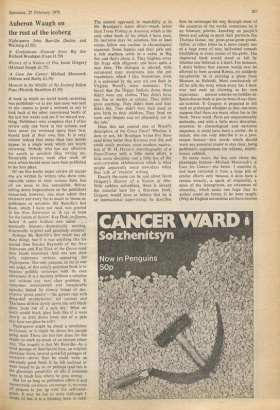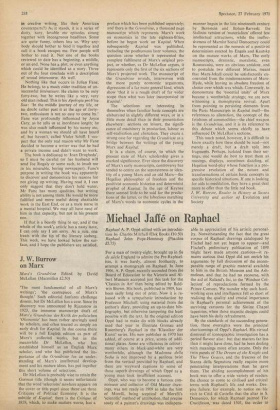Auberort Waugh on the rest of the iceberg
A Confederate General from Big Sur Richard Brautigan (Cape £1.50) History of a Nation of One Jecon Gregory (Michael Joseph £1.75) tA Cure for Cancer Michael Moorcock (Allison and Busby £1.50) Memoir in the Middle of the Journey Julian Pane (Hamish Hamilton £1.50)
A week in which no novel worth reviewing was published—or at any rate none was sent to me—seems as good a moment as any to look back at the other unreviewed books of the last few weeks and see if we missed any- thing. Publishers who complain that I often review only one book in this column and have never yet reviewed more than two, should look at their own lists. It is very seldom indeed that more than two novels appear in a single week which are worth reviewing. Nobody who has any affection for novels or novelists likes writing un- favourable reviews, week after week, of work which should never have been published in the first place.
Of the five books under review all except one are written by writers who show con- siderable talent in their various field, but all are more or less unreadable. Before calling down imprecations on the publishers concerned, however, one must admit that reviewers are every bit as much to blame as publishers or novelists. Mr Banville's last book, which I have not read, was greeted in the New Statesman as 'A ray of hope for the future of fiction'. Kay Dick, in Queen, hailed 'A quite brilliant new talent . . . Poetically literate,, dramatically exciting, structurally original and genuinely creative.'
Perhaps Mr Banville's first novel was all these things, but if it was anything like his second then Stanley Reynolds of the New Statesman and Kay Dick of the Queen need their heads examined. And one sees simi- larly rapturous reviews appearing for Nightspawn. The only purpose, so far as one can judge, of this utterly pointless book is to impress gullible reviewers with its own cleverness. It is a mystery without a solution and without any very clear problem. It comprises unconnected and inexplicable episodes linked by clumsy lumps of des- criptive 'prose poetry'—`the gutters ripe with discarded prophylactics' (of course) and 'Darkness drifted slowly down like soft black glass, from out of a pale sky.' What on earth would black glass look like if it were Slowly to drift down from out of a pale Sky; how can glass be soft?
Nightspawn might be about a revolution
Greece, or it might be about five people going mad. There are too few clues for the reader to work up much of an interest either Way. The tragedy is that Mr Banville—by a Vivid passage of description here, an original Character there, several powerful passages of narrative—shows that he could write an extremely good book if he felt inclined or Were forced to do so, or perhaps (and this is the gloomiest possibility of all) if someone Were to teach him where he goes wrong.
But for as long as publishers allow it and moonstruck reviewers encourage it, we must all prepare to put up with this self-indul- gence. It may be fun to write (although I doubt it) but it is a blinding bore to read. The nearest approach to readability is in Mr Brautigan's latest effort—much better than Trout Fishing in America, which is the only other book of his which I have read. Its narrative may be pointless, but at least events follow one another in chronological sequence. Some hippies and their girls and a rich madman settle in a cabin in Big Sur and that's about it. They frighten away the frogs with alligators and have quite a nice time. The dialogue is relaxed, with occasional zany excursions into the pot vocabulary, which I like. Sometimes, even, it is enlivened by the sour wit one finds in Virginia Woolf's saner moments: 'I've heard that the Digger Indians down there didn't wear any clothes. They didn't have any fire or shelter or culture. They didn't grow anything. They didn't hunt and they didn't fish. They didn't bury their dead or give birth to their children. They lived on roots and limpets and sat pleasantly out in the rain.'
Does this not remind one of Woolf's description of the Great Frost? Whether it does or not, Mr Brautigan writes five thou- sand times better than Kerouac ever did, and could easily produce some modern equiva- lent of W. H. Davies's Autobiography of a Super-Tramp with a little more effort, a little more discipline and a little less of the semi-articulate exhibitionism which is what people apparently mean nowadays when they talk of 'creative' writing.
Exactly the same can be said about Jecon Gregory's History of a Nation of One. With ruthless sub-editing, there is already the material here for a first-class book. Gregory would have us believe that he is an international super-tramp; he describes how he scrounges his way through most of the countries of the world; sometimes he is an itinerant painter, knocking on people's doors and asking to paint their portraits like Thomas Gosse, my great-great-great-grand- father; at other times he is more simply one of a huge army of nice, halfwitted nomads hitchhiking to every corner of the globe. The improved book would stand or fall by whether one believed it. I don't. For instance, I don't believe that anyone would ever be allowed to bum around Russia, yet suddenly inexplicably he is catching a plane from Moscow to Helsinki. Most conclusively of all he tells the story which every liar I have ever met ends up claiming as his own experience: ancient-relative-on-holiday-in- Spain-dies-so-body-is-put-in-boot-of-car-then- car-is-stolen. If Gregory is prepared to tell such an archetypal whopper as that, one must suppose that there are many other lies in the book. Never mind. Parts are unquestionably authentic, and with a little more discipline, attention to chronological and narrative sequence, it could have been a corker. As it stands, one can only describe it as a pica- resque fantasy—two words which should warn any potential reader to stay clear, being publisher's euphemisms for whimsy, exhibi- tionist rubbish.
In many ways, the less said about the picaresque fantasy—Michael Moorcock's A Cure for Cancer—the better. I mention it, and have extracted it from a large pile of similar efforts only because it does have a certain vivacity, a spark of originality, a sense of the incongruous, an awareness of absurdity, which make one hope that its author could do better, if he were taught. (Why do English universities not have courses in creative writing, like their American counterparts?) As it stands, it is a series of dotty, zany, lovable etc episodes strung together with incongruous headlines. Some are quite funny, others less so. Why any- body should bother to bind it together and call it a book escapes me. Few people will bother to read it. Not one of the books reviewed to date has a beginning, a middle, or an end. None has a plot, or even anything which could be identified as a story. Three out of the four conclude with a description of sexual intercourse. Ah well.
Nothing like that occurs in Julian Fane. He belongs to a much older tradition of un- successful litterateurs. He claims to be only forty-two, but he writes like a very, very old man indeed. This is his Apologia pro Vita Sua: 'In the middle journey of my life, or no doubt rather past it at the age of forty- two, enthusiasm is not so easy to come by.' Fane was profoundly influenced by Joyce Cary, as he tells us at inordinate length; he was also much influenced by his nanny etc, and by a woman we should all have heard of, but haven't, called Violet Schiff. I sus- pect that the only real reason why Mr Fane decided to become a writer was that he had a private income and didn't want to work.
The book is dedicated to 'Joan Drogheda', so I must be careful (or her husband will send Joe Rogaly or some such, to insult me in his miserable, boring newspaper). Fane's purpose in writing the book was apparently to discover and demonstrate his reasons for not giving up writing. Having read it, I can only suggest that they don't hold water. Mr Fane has many qualities, but writing ability is not among them. He would be more fulfilled and more useful doing charitable work in the East End, or as a male nurse in a mental hospital. We may all have need of him in that capacity, but not in his present one.
If that is a beastly thing to say, and if the whole of the week's article has a nasty taste, I can only say I am sorry. As a rule, one treats with the tip of the literary iceberg. This week, we have looked below the sur- face, and I hope the publishers are satisfied,



































 Previous page
Previous page